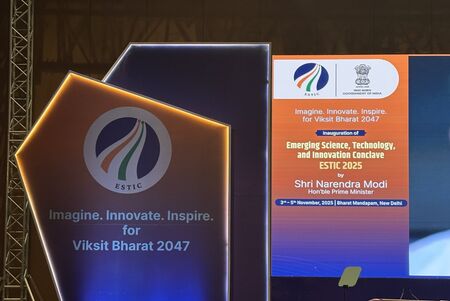Science
India Advances Towards Developed Nation Status Through AI Growth

India is making significant strides towards becoming a developed nation, focusing on leadership in Artificial Intelligence (AI) technologies and enhancing its digital public infrastructure. This assessment emerged during discussions at the Emerging Science, Technology and Innovation Conclave (ESTIC) 2025 held at Bharat Mandapam in New Delhi on November 3, 2023. Experts convening at the event praised India’s progress across various sectors, with Prime Minister Narendra Modi highlighting advancements from health to space.
Bhushan Pathwardhan, a professor at Pune Savitribai Phule University, noted the transformation in India’s role, stating, “Earlier, we used to be just followers; now we are leaders. This is a very big change.” He emphasized that the current progress is just the beginning, signaling a rapid trajectory toward development.
The dialogue at the conclave also included notable insights into the surge of AI and digital models in India. An attendee, identified as Nidhi, expressed optimism about the nation’s future in technology. “I’m sure that there will be a day when India will be the topmost country, excelling in digital AI,” she stated. She pointed to the newly launched RDI scheme, which allocates ₹1 lakh crore (approximately USD 12 billion) to boost research and development. Nidhi underscored the importance of investment in fostering innovation, declaring, “Unless money is around, innovations are also impossible.”
Dr. Rahul Singh, CEO at the Medical Incubation Centre at Government Institute of Medical Sciences (GIMS) in Noida, commended the RDI scheme as a timely initiative for India’s growth. “Such a fund and such a platform are at the right time for India in the run for 2047,” he remarked. He also highlighted the role of the Anusandhan National Research Foundation (ANRF) in facilitating research scalability and fostering an ecosystem for innovation and product development.
The discussion also touched on the role of women in technology, as Dr. Meena Krishnayya noted the shift from being consumers to pioneers of technological transformation. “Our technology is going very far. And females are also moving ahead, especially in science,” she remarked, referencing Prime Minister Modi’s emphasis on the growth of women in STEM fields.
In agriculture, advancements in drone technology and fertilization methods were highlighted as contributing to improved nutritional outputs. Mangi Lal Jat, Director General at the Indian Council of Agricultural Research (ICAR), relayed that Prime Minister Modi’s address focused on tackling malnutrition and enhancing soil health. Jat stressed the importance of bio-fortified crops and the utilization of biological sources and biofertilizers to achieve nutritional security.
Dr. Monika Garg pointed out that India’s aspirations to join the ranks of developed nations could be realized with the right incentives and infrastructure. “If we have proper incentives, proper instruments, proper facilities, then it won’t take long for India to become a developed country,” she concluded.
As India forges ahead with its ambitious plans, the collective insights from experts at ESTIC 2025 paint a picture of a nation poised for significant growth and innovation, particularly in technology and agriculture, setting a promising foundation for the future.
-

 World5 months ago
World5 months agoSBI Announces QIP Floor Price at ₹811.05 Per Share
-

 Lifestyle5 months ago
Lifestyle5 months agoCept Unveils ₹3.1 Crore Urban Mobility Plan for Sustainable Growth
-

 Science4 months ago
Science4 months agoNew Blood Group Discovered in South Indian Woman at Rotary Centre
-

 World5 months ago
World5 months agoTorrential Rains Cause Flash Flooding in New York and New Jersey
-

 Top Stories5 months ago
Top Stories5 months agoKonkani Cultural Organisation to Host Pearl Jubilee in Abu Dhabi
-

 Sports4 months ago
Sports4 months agoBroad Advocates for Bowling Change Ahead of Final Test Against India
-

 Science5 months ago
Science5 months agoNothing Headphone 1 Review: A Bold Contender in Audio Design
-

 Top Stories5 months ago
Top Stories5 months agoAir India Crash Investigation Highlights Boeing Fuel Switch Concerns
-

 Business5 months ago
Business5 months agoIndian Stock Market Rebounds: Sensex and Nifty Rise After Four-Day Decline
-

 Sports4 months ago
Sports4 months agoCristian Totti Retires at 19: Pressure of Fame Takes Toll
-

 Politics5 months ago
Politics5 months agoAbandoned Doberman Finds New Home After Journey to Prague
-

 Top Stories5 months ago
Top Stories5 months agoPatna Bank Manager Abhishek Varun Found Dead in Well









